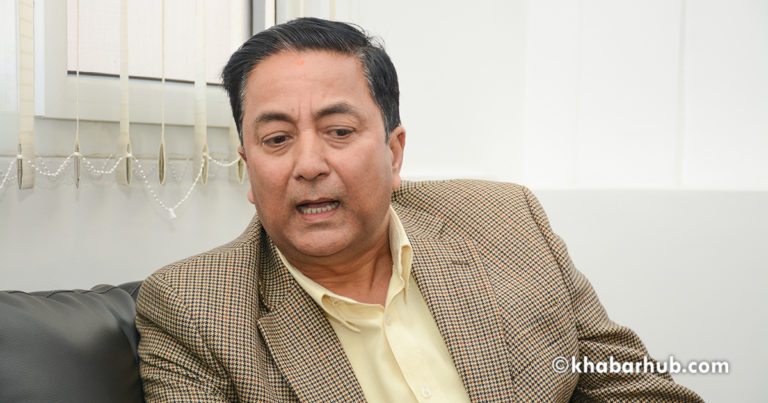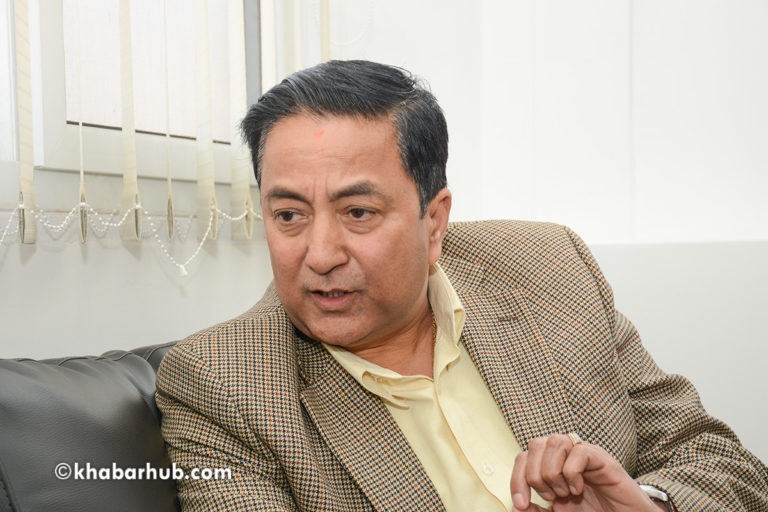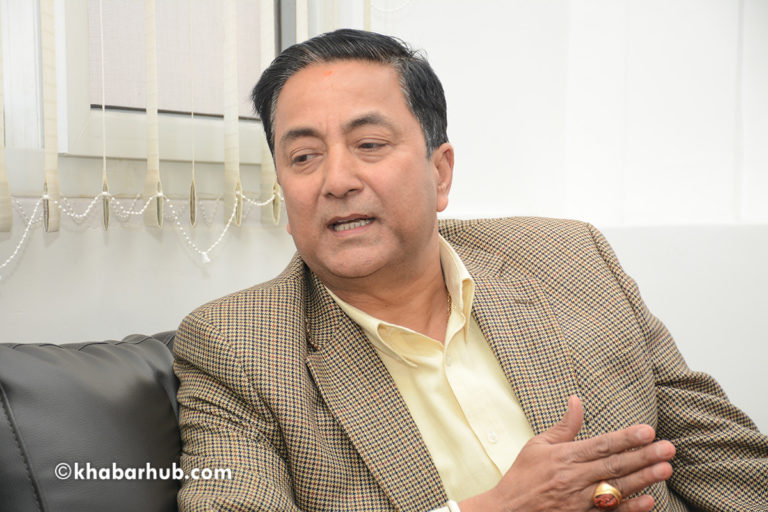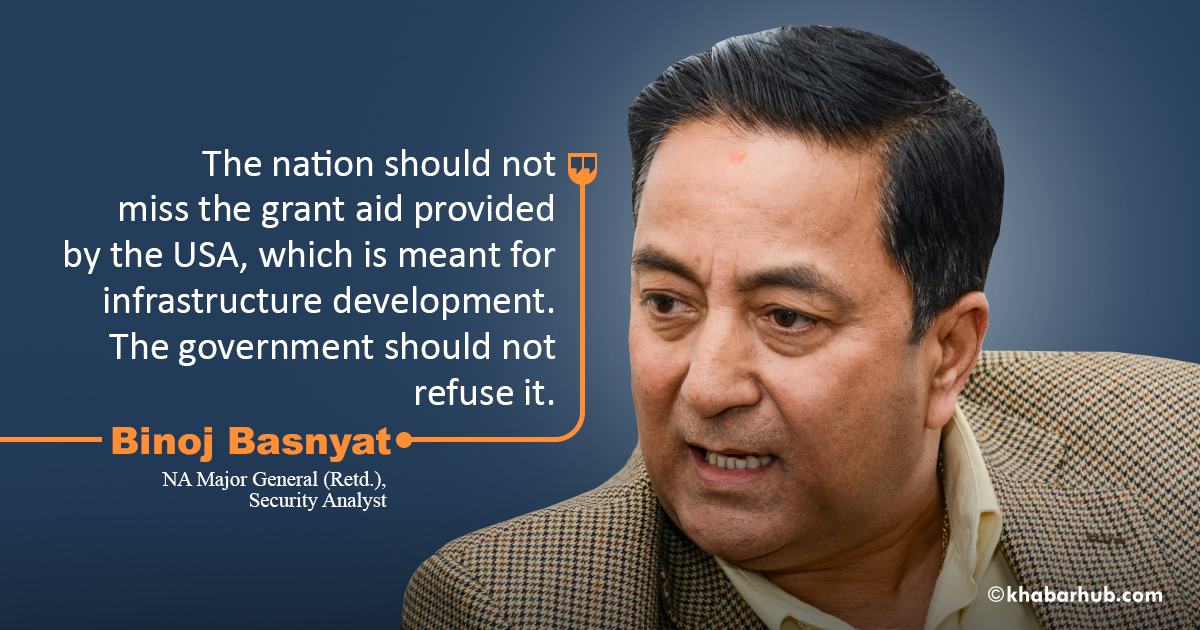KATHMANDU: The provision related to the ratification of the Millennium Challenge Corporation (MCC) has turned out to be a hard nut to crack for the Government of Nepal.
The MCC Compact signed between the Government of Nepal and the US Millennium Challenge Corporation meant to ease Nepal’s hassles in power trade and road network expansion has been criticized speculating it could be a part of US military affair.
Both the government of Nepal and the US Embassy here have reiterated that the compact has no connection with any military affairs, yet the dispute media mongering against it seems to go on.
Military strategists and experts opine that the MCC dispute now floored in the ruling Nepal Communist Party (NCP) is not related to any military affairs.
Lately, the public concern has mounted when the ruling NCP has formed a 3-member team to ‘study and recommend’ about the Compact.
Here are the excerpts of the interview Khabarhub had had with Binoj Basnyat, a strategic military expert, now a retired Major General of Nepal Army, to reach the crux of the issue:
The MCC has become the talk of the town these days. The public seems divided on this issue. What is your take on the ongoing debate on the inter-link between MCC and Indo-Pacific Strategy (IPS)?
IPS and MCC are different things. IPS, which got formally declared from the Department of Defense last year, is one of the policies like national security strategy, defense policy and South-Asia policy.

Generally, their policies guide their defense strategy and security strategy. MCC came into existence long before IPS. This is a grant aid Nepal bagged after competing with many aspiring nations.
MCC project will expire in July 2025. Can Nepal get some economic benefits? What are the prospective benefits for Nepal?
In the case of Nepal, the project is focused on infrastructure development. Construction and expansion of cross-border transmission lines, expanding the road network are the identified areas to work upon. Which sector of these two areas is going to be helped is also specified.
I think, firstly, we have not made our public clear about our resources and the utilization. Otherwise, we need not link it with IPS and take it as a part of IPS.
Secondly, as people have started talking about IPS, saying it is a strategy to gherao China or the Compact will let the US Army march in Nepal. I do not think that these things are relevant for us to discuss. They lack the sense that way. We have to focus more on development. We should not waste time talking about the things that are not directly our concern.
The debate as it is, what may have triggered it?
We have to know that there are risks. I have seen two things here. Firstly, the information is wrong. The way fake news is disseminated and the wrong impact it has created is unfortunate. See the fake news and rumors about the MCC compact!
The fake news like ‘America is trying to encircle China’, ‘America is trying this or that’, ‘America is deploying US Army in three districts’ etc are disseminating the wrong message both to the public and international arena. It is misleading to the public and defaming the nation as it sends the wrong message that Nepali people run after rumors.

Another remarkable issue is, mainly the ruling party leaders are protesting MCC. It gives space to wonder whether it’s an attempt to divert the mind of the public from other burning issues like encroachment of border, sovereignty, or non-alignment, etc. If the hidden intent is so, it’s unfortunate for the country. Our leaders should think about the best interest of our nation; they should understand that other nations have their own leaders to defend those nations.
Don’t you smell foul intent of some international power centers playing in it?
We should assess it. Everyone has their interests. All countries like the USA, India, and China have their own interests. For example, Belt and Road Initiative (BRI) is a Chinese project.
There are other projects as well. The projects are somehow centered on how they can make their space in South Asia. It’s all about their interest. We have to find out what or which one is good for us. We should tell which one fits our modality.
We should ensure whether MCC, BRI or India’s assistance benefits Nepal. We should be united for the national interest and national benefit. It’s up to the government to find out what’s cooking or what’s happening in the society; which factors are responsible for such divisions, etc. The government should use its resources to find out what’s responsible for unrest, misconceptions or rumors and address accordingly.
The crux of the issues is corruption. Everyone knows about it. If someone grows rich all of a sudden, the state mechanisms should find out how that person became rich.
Nepali Congress, Rastriya Janata Party, and Rastriya Prajatantra Party say MCC should be ratified while NCP seems divided. What will happen if MCC is not ratified?
It won’t go that way. The nation cannot miss the grant aid provided by the USA and meant for infrastructure development. The government cannot refuse it. It’s like a compulsion, the government will accept it by all means.
Another serious thing to ponder is the way leadership may be used. If Nepali leaders are used for another country, ways should be devised to find out how they are mobilized and we should find the way out as well.
There are queries about why MCC should be ratified from the parliament. Why should Nepal seek Indian consent. How can we let other laws prevail over our domestic laws?
Actually, in such matters, we have to consider what the previous practices were. We should explore why Nepal failed to attract FDI. It also indicates people’s decline of faith in the government.
Perhaps the rationale behind the provision for ratification from the parliament could be the precaution to avoid the chances of changing the conditions in case the government is changed. If the government that comes after makes changes in the ongoing project, it might add complexities to the compact.
Perhaps, the donors want to be ensured the uninterrupted execution of the project. If it’s kept there to ensure that once the project is initiated it should be executed successfully, without any hassles in between. We have to explore are we going to benefit from it or not.
Our products should not be confined to the domestic market or Indian market alone, it should go beyond that as well.

Once we get Indian consent, our market automatically reaches to Bangladesh. We can export electricity to Bangladesh and then we can import gas from Bangladesh through pipelines.
If we look at the future, it shows that the USA has done it for Nepal. Therefore, I think, it’s beneficial to Nepal.
I feel people are confused due to the wrong information. If another group comes ahead and initiates campaigns against the $50 billion loans China has promised, should we go after the protest or decide rationally? I think the government or the politicians should not be swayed away by the mass alone, they should instead use their conscience. Otherwise, it establishes a wrong precedent.
Nepal should look at its benefits. The electricity generation in Nepal helps in the country’s poverty reduction. The money the US government is giving is its people’s money, Nepal should accept this grant aid.
What can be the reasons behind such misconceptions and wrong information?
I do not think that such fake news is just the product of social media; so it cannot be curbed through social media; rather, it will increase. The government should heed it. This is a global problem now.









Comment